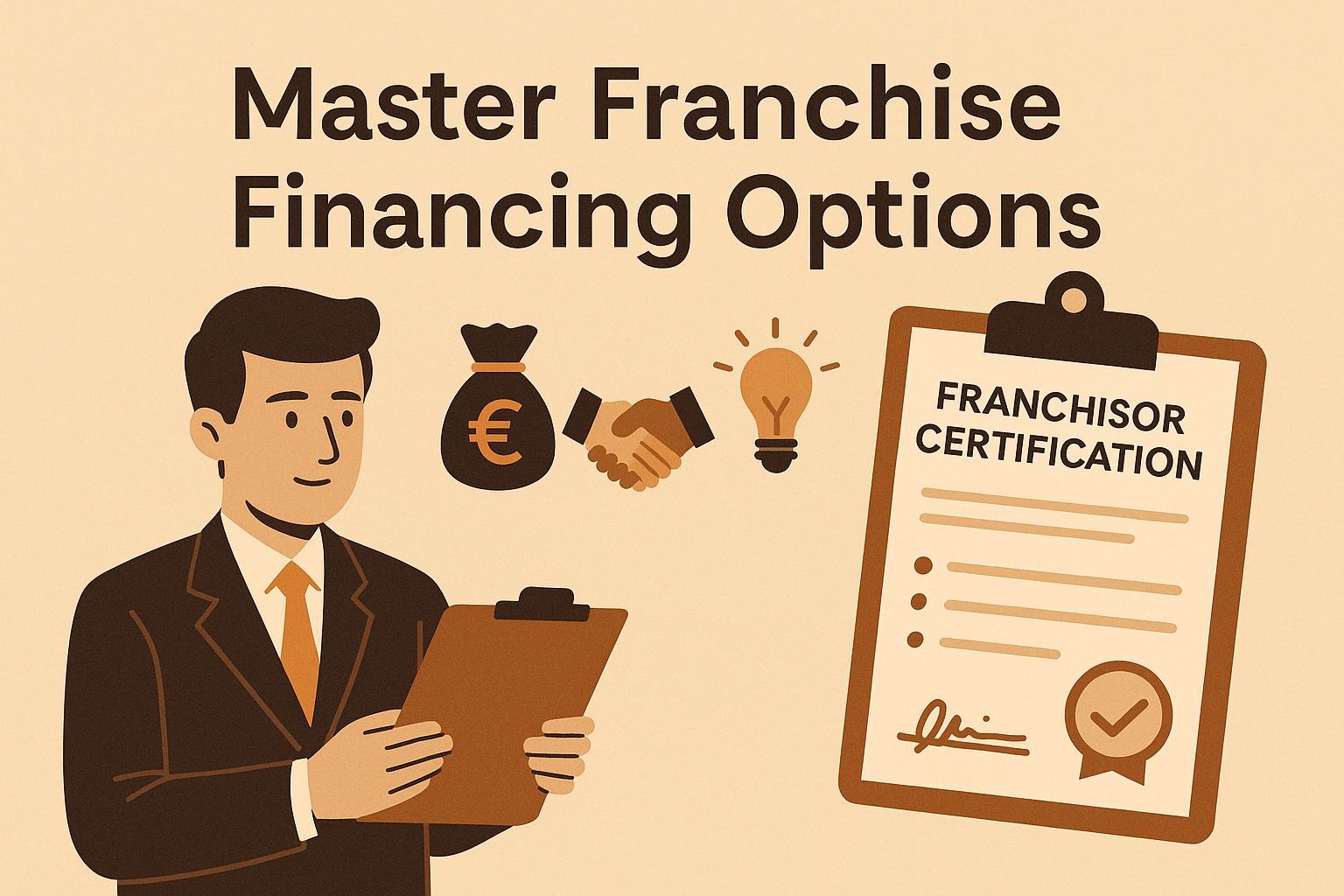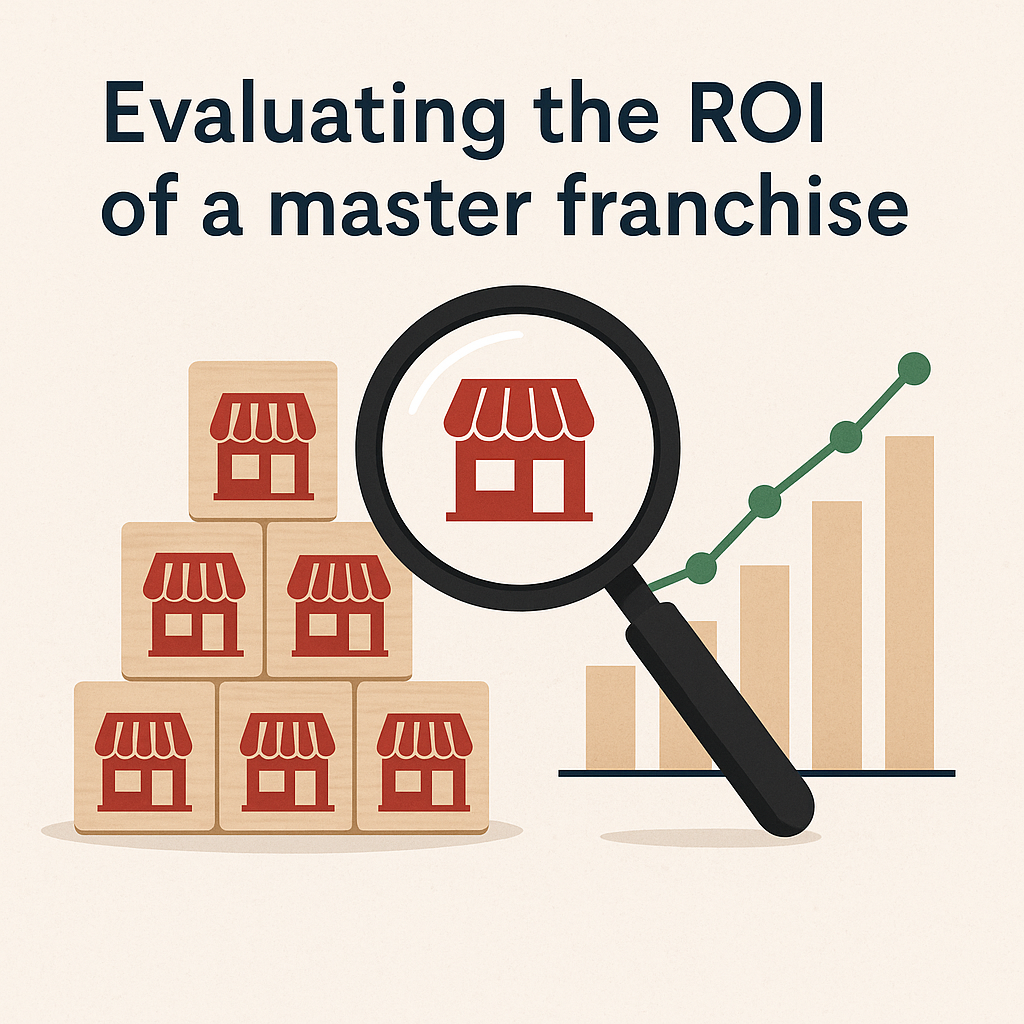Securing the right financing is a critical step in launching a master franchise in France.
Master franchise agreements often require a significant capital outlay – from hefty franchise fees to the costs of establishing a local franchise network infrastructure. This article provides a detailed look at the various financing options available to master franchise investors, including traditional bank loans, partnerships and equity investors, and alternative funding sources. Tailored for an international audience of investors and franchisors, the discussion emphasizes a legal-professional perspective: understanding financing mechanisms, assessing their implications, and structuring deals in compliance with French regulations and sound business practice. By exploring loans, partnerships, and creative funding methods, prospective master franchisees can assemble a financing strategy that balances risk and control, ensuring they have the necessary capital to successfully develop the franchise while safeguarding their financial interests.
Launching a master franchise requires meeting formal requirements and careful documentation, much like completing a detailed certification process. The image shows a franchisor certification form on a clipboard, symbolizing the rigorous due diligence and approval steps often involved in financing a franchise venture. Prospective master franchisees must prepare robust documentation (business plans, financial statements, etc.) to secure funding from banks or investors.
Assessing capital requirements for a master franchise
Estimating the Investment Needs: Before diving into funding options, a master franchisee must quantify how much capital is needed. A master franchise investment in France typically includes: (1) the master franchise fee paid to the franchisor for territorial rights; (2) the cost to establish at least one pilot or flagship unit (as franchisors often require the master franchisee to open a company-owned outlet to demonstrate the concept locally); (3) initial setup costs for a support office – including hiring staff, legal and advisory fees, and acquiring any necessary equipment or real estate for training centers or offices; and (4) a reserve of working capital to cover operating expenses until the business becomes self-sustaining. It’s not unusual for master franchise rights for an entire country like France to cost hundreds of thousands or even millions of euros, once all these factors are included. For example, if a master franchise fee is €500,000, one might need a similar amount (or more) in additional capital for setup and operations, meaning the total funding required could be €1 million or above. By creating a detailed business plan with financial projections and a breakdown of these costs, an investor can determine how much financing is necessary upfront and potentially in later stages of growth.
Staged Funding vs. Lump Sum: It’s important to consider when the capital is needed. Some master franchise deals might allow payment of the territory fee in installments, or the development schedule might mean that certain costs (like opening multiple training centers or additional company units) occur after a year or two of operation. This opens the possibility of staged financing – not having to raise the entire sum on day one, but rather funding the business in phases. For instance, an initial tranche of capital to secure the franchise rights and launch the first outlets, then subsequent financing rounds as the network grows. Many master franchisees reinvest early revenues (from selling sub-franchises or initial franchise fees) to fund further expansion. A clear understanding of the cash flow timeline will influence the choice of financing: short-term needs might be met with a bridge loan or personal funds, whereas longer-term growth capital might be raised through equity partners once the concept is proven in the territory.
Financial Criteria and Franchisor Requirements: Franchisors often set financial criteria for master franchise candidates. They may require evidence of a minimum net worth or available liquid capital as part of the vetting process. For instance, a franchisor might insist that a master franchisee for France have a net worth of €2 million and at least €500,000 in liquid assets. These requirements are put in place to ensure the master franchisee can adequately capitalize the development of the brand in the region. From a legal perspective, while a franchisor cannot dictate exactly how you fund the business, they can require proof that you have funding in place. Thus, when planning financing, know that you may need to present a personal financial statement or financing commitment letters to the franchisor before finalizing the deal. The franchisor’s confidence in your financing plan can also impact negotiations – a well-funded master franchisee might negotiate more favorable development terms, whereas a poorly funded one could face stricter conditions or even rejection.

Traditional debt financing: Bank olans and eyond
Commercial Bank Loans: The most common financing route is a loan from a commercial bank. In France (and many countries), banks do lend to franchise businesses, especially if the franchise brand is well-known and has a strong track record. To secure a bank loan for a master franchise, the borrower (individual or company set up for the franchise) typically needs a solid credit history, a thorough business plan, and often collateral. Banks will evaluate the franchise proposition somewhat like any other business: projected cash flows, the experience of the operators, and the assets that can secure the loan. Collateral might include real estate, other business assets, or personal guarantees. It’s common for banks to ask the investor to put in a significant equity injection (personal funds) – often at least 20-30% of the total project cost – before they lend the rest. For example, if €1 million is needed, a bank might lend €700k if the investor contributes €300k from their own pocket. This ensures the borrower has “skin in the game.” The loan terms (interest rate, duration) will depend on market rates and the risk profile; franchise loans might range from 5 to 7 years in term for initial fees (which are intangible) or longer if tied to tangible assets like property.
Government-backed loans and assistance: In some cases, special loan programs can facilitate financing. In the United States, the Small Business Administration (SBA) loan program is famous for helping franchisees by partially guaranteeing loans (making banks more willing to lend). In France, while there isn’t an exact SBA equivalent, there are initiatives like Bpifrance (the public investment bank) which may guarantee a portion of small business loans or provide loans to support business creation and expansion. Bpifrance often works with commercial banks to encourage lending to entrepreneurs, including franchisees. For example, Bpifrance might guarantee 50% of a loan’s amount, reducing the bank’s risk. Additionally, France has entrepreneur support programs such as Initiative France or Réseau Entreprendre that offer zero-interest loans or grants to new businesses (some master franchisees have utilized such programs especially if they create local employment). It’s worthwhile for a master franchise investor to research if their project qualifies for any public aid or subsidized loan. These programs can lower the cost of capital or the required collateral. However, be mindful of any conditions attached – for instance, a government loan might require a certain number of jobs to be created or limit the use of funds to certain expenditures.
Franchisor financing programs: Occasionally, franchisors themselves offer financing assistance to master franchisees. This could come in a few forms: a direct loan from the franchisor for part of the franchise fee, a deferred payment plan for the franchise fee, or an introduction to preferred financial partners. Some large franchise systems have in-house financing arms that can finance the franchise fee over time (this is more common for unit franchises, but master franchises could be considered in certain cases). More commonly, franchisors might have preferred lender networks. For example, they might have relationships with international banks or financing companies familiar with the franchise, which can streamline the loan process for the franchisee. If the franchisor is publicly traded or well-capitalized, they might also invest in the master franchisee’s entity (though that starts veering into partnership territory). It’s worth discussing financing in initial negotiations with the franchisor – while they may not advertise financing, some flexibility might be negotiated, such as splitting the territory fee into payments over a couple of years, which effectively finances part of the investment interest-free (or at a low interest). Always ensure any such arrangements are clearly documented in the franchise agreement or a collateral contract, to avoid disputes later. And remember, if the franchisor offers a loan, they may take a security interest in the franchise or other assets, which could complicate the picture if you also have bank loans (priority of claims, etc., should be sorted out by legal counsel).
Alternative debt lenders: If traditional banks are not an option or not sufficient, alternative lenders could fill the gap. These include private lending companies, fintech lenders, or crowdfunding platforms that provide debt financing (sometimes called peer-to-peer lending). They often have faster approval processes and more flexibility in credit criteria, but usually at the cost of higher interest rates or shorter repayment periods. For a master franchise, alternative lenders might fund a portion of the need, especially if the investor has some track record. For example, a fintech lender might offer a €200k loan based more on projected franchise cash flows and personal credit scores, even if a bank was hesitant. Legal consideration: ensure any loan, whether bank or alternative, does not conflict with the franchise agreement’s terms (e.g., some franchise agreements require franchisor consent to certain encumbrances or to any change in control if you pledge shares as collateral). It’s wise to have a lawyer review loan agreements in the context of your franchise commitments.
Equity financing and partnerships
Bringing in investors/partners: Another route is to raise capital by bringing in one or more equity investors. This could mean forming a partnership or company in which investors contribute cash in exchange for ownership shares in the master franchise venture. Equity financing doesn’t require repayment like a loan, but it does mean sharing future profits (and possibly decision-making power) with partners. Many master franchisees are actually entities formed by a small group of entrepreneurs or a joint venture between, say, a local businessperson and a foreign investor or even the franchisor. By pooling resources, they can meet the capital requirements without heavy debt. For example, if €1 million is needed, two partners might each put €500k instead of one person trying to borrow most of it. From a legal perspective, a clear shareholders’ agreement or partnership agreement is essential to outline how decisions are made, how profits are distributed, and what happens if additional funding is needed or if one partner wants to exit.
Pros and cons of equity funding: The major advantage of equity funding is that it reduces the debt burden and can bring in partners with valuable expertise or connections (not just money). Especially in a complex market like France, a foreign investor might partner with a local entrepreneur who knows the market, contributing both capital and local market knowledge. However, equity is generally more “expensive” than debt in the sense that investors will expect a significant return on their capital – often higher than what a bank’s interest rate would be, since they are taking on risk as owners. They may expect a strong dividend stream or a large payout if the business is sold. Additionally, bringing on investors can complicate governance; disagreements may arise, and legally one must manage fiduciary duties to minority shareholders. Structurally, one should consider what form the partnership takes: a société par actions simplifiée (SAS) is a common flexible corporate form in France suitable for joint ventures, allowing custom governance structures in the bylaws. An SARL (limited liability company) can also be used but has more rigid rules. The choice may depend on tax considerations too – investors will want to consider whether they get returns via dividends (taxable) or can sell shares later (capital gains considerations).
Joint ventures with the franchisor or local firms: In international master franchising, a frequent model is the joint venture (JV) approach: the franchisor itself may decide to co-invest in the master franchise entity along with a local partner. This reduces the capital the local partner needs to bring and ensures the franchisor has skin in the game and influence over brand development. For instance, a franchisor might take a 20% equity stake, with the master franchisee holding 80%, while possibly reducing the upfront fee in exchange. From a legal viewpoint, a JV with the franchisor can impact how the franchise agreement is drafted – some terms might be more flexible since the franchisor is on both sides to an extent (but also expect that the franchisor will have strong protections for their brand). Alternatively, a master franchisee could form a JV with a local company that has complementary resources – say a large retail group in France – to leverage their infrastructure and capital. In fact, this can be a very effective strategy: the local group might provide capital and existing operational infrastructure (warehousing, HR, etc.), while the master franchisee provides franchise-specific know-how and focuses on network development. Naturally, such arrangements require careful contracts to delineate roles and profit sharing.
Investor expectations and exits: When structuring equity financing, discuss the expectations up front. Are investors looking for annual dividends from the franchise profits, or a big payoff later (for example, if the master franchise is sold or if an IPO is done)? The answer will shape the growth vs. payout strategy. Also, plan for exit mechanisms: investors might want the right to force a sale after X years, or the right of first refusal if one party wants to sell their stake. Including dispute resolution and buy-sell clause frameworks (like shotgun clauses or put/call options under certain conditions) can save pain later. Legally, if any external investors (not involved in management) are brought in, compliance with securities laws should be observed – in France, private offerings are common for small groups of investors, but one must avoid any public offering of securities without proper regulations.
The cost of equity – giving up control: A candid legal-financial insight: bringing in partners is often more expensive than borrowing in the long run. As one franchise finance expert noted, while bringing on partners may bring cash and skills, they will demand a higher return on their investment than a bank would on a loan, because they take on more risk and expect to share in success. This means if the franchise does exceedingly well, a portion of that upside goes to the partners. However, if borrowing is not feasible or would strain cash flows, equity is a viable and sometimes the only route. It also spreads risk – you won’t bear losses alone if things don’t go as planned. Deciding between debt and equity (or a mix) involves considering one’s risk tolerance, desired control level, and financial flexibility. Many master franchisees use a combination: for example, personal funds + a bank loan + a minority equity investor. This way, risk and control are balanced – moderate leverage from the loan (to amplify ROI on personal equity) and some partner money to lighten the debt load.
Alternative and creative funding sources
Personal assets and self-funding: A number of franchise investors tap into personal assets to fund part of the venture. This could be through using savings, liquidating certain investments, or leveraging assets like real estate. For instance, an entrepreneur might take a second mortgage on a property or use a home equity line of credit to raise funds. Others might use proceeds from a previous business sale. Self-funding has the advantage of not diluting ownership or incurring debt obligations to a third party, but it concentrates risk on the individual. One strategy observed especially in the U.S. is using retirement funds (through mechanisms like ROBS – Rollovers as Business Startups, where one can invest retirement funds into their business without immediate tax penalties). In France, withdrawing from retirement savings early is less common due to tax penalties, so that strategy is more US-centric. Nonetheless, personal funding underscores the importance of not overextending: one should not put all personal wealth on the line without a backup plan. A prudent approach might be to commit personal funds up to a certain threshold and combine with other sources to avoid catastrophic personal loss if the venture fails. It’s also wise to keep some contingency reserves; businesses often need more cash than initially forecast.
Friends, family, and “love money”: Friends and family are a traditional source of financing for entrepreneurs, sometimes referred to as “love money.” This can be structured as informal loans or as equity. Borrowing from friends/family might carry little or no interest and flexible terms, which is a benefit if you have that support. However, these arrangements should be handled with care: it’s highly recommended to put the terms in writing – even a simple promissory note or loan agreement – to avoid misunderstandings. Additionally, one must consider the relationship risk: if the business struggles and you cannot repay, personal relationships could be strained. In the context of a master franchise, given the large sums, friends/family might only cover a portion unless one’s circle is particularly wealthy. Still, it can bridge a gap. Sometimes, a family member might invest as a silent partner, which overlaps with the equity discussion above. The legal side here is usually straightforward in terms of not being regulated (private, within family), but ensure that even informal investors are aware of the risks – essentially you might have to play the role of explaining that this is not a guaranteed return, as a matter of good faith and perhaps to avoid later disputes.
Crowdfunding and private investors: In recent years, crowdfunding has emerged as an alternative, though it’s more commonly seen for product-based start-ups than franchises. There are equity crowdfunding platforms in Europe where a business can raise money from many small investors in exchange for equity. A master franchise might not be the typical candidate for crowdfunding, but if the brand is attractive and the story is compelling (e.g., “help bring this popular foreign brand to France, invest alongside us”), it could be attempted. Keep in mind, equity crowdfunding triggers regulatory requirements (prospectus exemptions, etc.) if above certain thresholds, and managing many small shareholders is cumbersome. Another angle is finding angel investors – affluent individuals who invest in early-stage businesses. If the master franchise concept has high growth potential (perhaps aiming to expand to hundreds of units in France), pitching to angel investor networks or even venture capital (VC) might be possible. However, traditional VC tends to shy away from franchise deals because they are not easily scalable globally (the franchisee doesn’t own the brand). But there are specialized franchise investment firms that might take interest, especially in industries like food & beverage or multi-unit retail with roll-out potential.
Combination of Sources: Often, no single source provides all the funding, and a combination is used. For example, a financing plan could be: 40% bank loan, 30% personal/family funds, 30% equity partner. Combining sources can increase the overall funding available and diversify risk. However, it also means juggling multiple obligations – loan payments, investor relations, etc. Ensure that the combination is structured in a complementary way: for instance, if using both debt and equity, too much debt can make equity investors uneasy (they get paid last, after creditors). Conversely, too little debt might lower your own return on equity (since you’re giving away a lot of upside to partners that money could have been borrowed more cheaply). A balanced capital structure in a franchise context might involve moderate leverage – enough to boost returns, but not so much that loan payments consume all the early cash flow.
Legal considerations in creative financing: With alternative funding, it’s critical to maintain compliance and clear agreements. If someone finances you informally, clarify if it’s a loan (with a fixed repayment) or an equity-like interest (profit sharing). Ambiguity can lead to later disputes or even allegations of an unregistered security if not done correctly. Additionally, any financing that involves revenue sharing or giving a cut of franchise fees needs to be carefully structured so as not to violate the franchise agreement (franchisors might restrict assignment of fees or require approval if you pledge franchise revenue as security). Always review the franchise contract to see if there are clauses about financing – some have clauses requiring notice or consent for certain financing arrangements, especially those that might affect control of the franchise entity.
Balancing financing options: risk, cost, and control
Cost of capital: One guiding principle in choosing financing is the cost of capital – essentially, how much does each euro of funding “cost” you in terms of interest, equity dilution, or future returns given up. Debt financing has interest and must be repaid, but if obtained at a reasonable interest rate, it can be cost-effective, especially if the business’s return on the borrowed money exceeds the interest rate. Equity financing costs you a share of profits indefinitely, which can be far more expensive if the franchise becomes very profitable. For instance, giving a 30% equity stake to an investor means 30% of profits (and potentially 30% of a future sale price) goes to them – which could dwarf what you would have paid in interest on a loan for the same amount of money if the venture succeeds. That said, if the venture does not succeed, equity investors share that downside (they generally can’t claw back their investment if it’s lost, whereas loans still need to be paid unless you go through bankruptcy proceedings). So there’s a risk-reward trade-off. As a master franchisee, you have to judge how confident you are in the success and how much risk you can personally bear. Often the outcome is a mix: use debt up to a prudent level (where you’re confident you can meet payments even in a slow start scenario) and use equity for the rest, so that no single source is overburdened.
Control and decision-making: Another factor is how financing affects your control over the business. A sole proprietor with a bank loan still makes all business decisions (though the bank might impose some covenants, like not taking on additional debt without consent, or maintaining certain financial ratios). Bringing in equity partners means certain decisions might require consensus or a board vote. You might have to give up some strategic freedom – for example, a partner could veto expanding into a new business line or could insist on faster expansion than you’re comfortable with, etc. It’s critical to set expectations and possibly formalize roles: if you want to retain operational control, you might structure the equity such that you still own more than 50% of voting rights, or you write in the agreement that you are the managing director with certain authorities. On the other hand, sometimes giving up some control can be beneficial if the partner is experienced. Many successful franchises involve a partnership where one person handles day-to-day operations while another (perhaps the investor or group) provides oversight and strategy input – a healthy governance structure can add discipline to the venture.
Risk mitigation: Every financing method carries risks. Debt risk is primarily financial – failing to meet payments can lead to default and possibly loss of the business (if the bank enforces security over assets). Equity risk is more about conflict and dilution – you might find yourself in disputes with partners or even at risk of being outvoted or ousted if you’re not majority owner and things go sour. Legally, to mitigate these, one can negotiate loan terms with flexibility (like interest-only periods until sub-franchise sales start, or the ability to draw additional funds if needed) and negotiate partner agreements with clear conflict resolution (like mediation clauses, or predetermined buyout formulas if someone wants to exit). It’s also wise to not over-leverage: franchise networks can be unpredictable; leaving some buffer in your financing plan (both in terms of money and time) is prudent. For instance, not counting on franchise sales at the maximum possible rate in your loan servicing plan ensures you don’t crash if sales are slower.
Professional advice: Given the complexities, consulting with franchise financing consultants or financial advisors is highly recommended. They can help structure a deal that optimizes the capital structure. Lawyers will ensure that the agreements (loan contracts, shareholders’ agreements, etc.) are correctly drafted and that your interests are protected. In France, notaries might be involved if collateral involves real estate. Also, discussing with the franchisor can provide insight – they might know how other master franchisees have financed in other countries and can share best practices or even connect you with lenders.
Preparing a strong case for financing
Business plan and financial projections: No matter which financing route (or combination) you pursue, a solid business plan with financial projections is a must. Lenders and investors will expect to see detailed forecasts showing how the master franchise will roll out: how many franchises per year, revenue per franchise, expenses, etc., typically over at least a 5-year period, plus a discussion of the market and strategy. The plan should also address risks and how you will mitigate them (e.g., what if franchise sales are slower – do you have flexibility to reduce costs?). A well-researched plan not only helps you secure financing but also demonstrates to the franchisor that you have a roadmap to execute the development schedule.
Personal financial preparation: For loans, your personal creditworthiness will be assessed. It’s wise to ensure your personal credit reports are in good shape – pay down unrelated debts if possible, avoid taking new loans before franchise financing (carrying too much personal debt can reduce capacity to borrow for the business). Lenders often require personal guarantees for small business loans; be mentally and legally prepared for that. It means if the business cannot pay, they can come after your personal assets. Negotiating the scope of guarantees (maybe limited to a portion of the loan or waived after the business shows performance for a few years) can be attempted, but banks may not always agree. In any case, know what you are signing up for.
Legal structure and compliance: Before receiving funds, you should have the appropriate legal entity set up (e.g., SAS company ready to operate the franchise). This entity will typically be the borrower or the partner vehicle. Ensure it’s registered and in compliance with French company laws – having the structure clean and ready instills confidence. For equity, this means the share capital is properly recorded, shareholders are registered, and any shareholder agreements are executed. For loans, it means having the capacity in your bylaws to borrow and provide security (most bylaws allow this by default, but it’s worth checking any limits). Also, if you anticipate needing to bring money from abroad, consider the exchange rate and repatriation issues; consult tax advisors on whether to inject funds as debt or equity into the French entity (there can be tax differences on interest vs. dividends).
Negotiating terms: When you have options (say you’re talking to multiple banks or multiple investor prospects), compare and negotiate terms. For loans: interest rate, term, collateral required, covenants (financial conditions) – try to get the lowest interest, longest repayment, and most flexibility possible. For equity: negotiate valuation (how much equity do they get for their investment), any preferred returns, and voting rights. For partnerships: clarify roles and expectations in writing. Remember to also plan for a worst-case scenario: for instance, if the business falters, how will debt be handled (is there an option to restructure?), or if partners disagree, how will you resolve it? Addressing these “prenup” style questions at the outset can save you from legal battles down the road.
Conclusion
Financing a master franchise in France is a multifaceted process that requires balancing financial pragmatism with strategic foresight. Options range from traditional bank loans and government-backed financing to bringing in equity partners and tapping alternative sources like personal assets or crowdfunding. Each avenue has its trade-offs: loans must be repaid with interest but let you retain full ownership, whereas equity investments share the risk but also the reward. Often, a hybrid approach is optimal, blending debt and equity to spread risk and cost. As emphasized, the cost of capital and control considerations should guide your decisions – cheap money (loans) can boost returns if used wisely, but too much debt can strain a young franchise network; equity can fortify your capital base and add expertise, but it demands diligent legal structuring to keep the venture on course. A well-prepared business plan and solid financial projections are your best tools to secure any type of funding, demonstrating to banks or investors that you understand the franchise model and have a road map for profitability.
Legally, it’s crucial to document every agreement, comply with franchise terms regarding financing, and protect your interests through sound contracts. As you navigate loans, partnerships, or other funding routes, lean on professional advisors to ensure that the financing structure sets up the master franchise for success rather than encumbering it with unsustainable obligations. With the right financing in place, a master franchisee can focus on building the franchise network, confident that the venture is well-capitalized. In summary, careful financing planning – aligning the funding sources with your strategic goals and risk tolerance – is a cornerstone of a successful master franchise launch. By exploring and combining the diverse financing options available, and doing so within a secure legal framework, you set the stage for growth, stability, and long-term achievement in your French master franchise endeavor.



